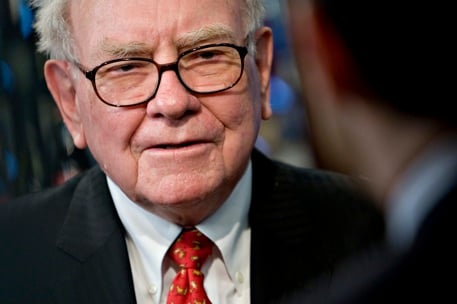Some intriguing stock purchases of late from Berkshire's boss; 'ample cash'
Berkshire Hathaway Inc. increased its Johnson & Johnson stake, repurchasing shares that Chairman Warren Buffett sold in the financial crisis to fund investments in firms including Goldman Sachs Group Inc.
Berkshire raised its stake in the New Brunswick, New Jersey-based drugmaker by 73 percent to 41.3 million shares from 23.9 million on March 31, according to a regulatory filing yesterday listing the company's U.S. equity holdings at the end of the second quarter. Buffett's firm took a 4.4 million-share stake in Brookfield, Wisconsin-based Fiserv Inc., the provider of electronic commerce services.
Buffett, 79, uses earnings and premiums from Omaha, Nebraska-based Berkshire's insurance units to invest in stocks and bonds and acquire companies. In 2008, he slashed his Johnson & Johnson stake and spent $14.5 billion on fixed-income securities issued by Goldman Sachs, General Electric Co. and Wm. Wrigley Jr. Co. Buffett said last year that he sold Johnson & Johnson shares to ensure Berkshire had “more than ample cash.”
“This kind of tells me that he's comfortable with the cash position now in Berkshire,” said Gerald Martin, a finance professor at American University's Kogod School of Business in Washington. “He's starting to building back up in the investments he wants to be in -- Johnson & Johnson and, of course, the new Fiserv” stake, Martin said.
Berkshire's cash holdings were about $28 billion as of June 30, compared with $25.7 billion at the end of the first quarter after Buffett's purchase of railroad Burlington Northern Santa Fe, the largest acquisition of his career. The J&J holding was valued at about $2.4 billion, based on yesterday's closing price. The Fiserv investment is valued at about $220 million.
The biggest U.S. stock indexes declined in the quarter. The Standard & Poor's 500 Index, which added Berkshire's Class B shares in February, fell about 12 percent during the period. The Dow Jones Industrial Average slipped 10 percent and the Nasdaq Composite Index decreased 12 percent.
Berkshire's earnings have helped replenish a cash position that dipped to $25.5 billion at the end of 2008 from $44.3 billion 12 months earlier. The company reported its first profit decline in five quarters for the period ended June 30 as derivatives bets suffered and equities fell. In 2008, Buffett stepped in to buy debt from to New York-based Goldman Sachs and GE when most money managers and banks retreated.
“To fund these large purchases, I had to sell portions of some holdings that I would have preferred to keep,” Buffett said of the Johnson & Johnson shares and stakes in Procter & Gamble Co. and ConocoPhillips. “However, I have pledged to you, the rating agencies and myself to always run Berkshire with more than ample cash,” Buffett said in his annual shareholders letter published in early 2009.
ConocoPhillips
Berkshire cut its stake in ConocoPhillips by 15 percent in the quarter ended June 30, the seventh straight reduction. Buffett, who also is Berkshire's chief executive officer, called the investment in the Houston-based oil company a “major mistake” after buying shares with oil prices near their peak in 2008.
J&J, which sells products from Listerine mouthwash to prescription drugs and hip replacements, is a “steady grower,” said Jeff Jonas, an analyst with Gabelli & Co., in a telephone interview. Bill Price, a spokesman for J&J, declined to comment.
Berkshire's holdings of Buffalo, New York-based M&T Bank Corp. declined 3.6 percent to 5.36 million shares. Berkshire is the second-largest M&T shareholder, according to Bloomberg data.
Berkshire's stake of Paris-based Sanofi-Aventis SA, France's largest drugmaker, increased 4.1 percent to 4.06 million American depositary receipts.
Fiserv, led by CEO Jeffery Yabuki, reported profit of $476 million last year, a 16 percent decline from 2008. The company, founded in 1984, sells information management and electronic commerce systems to banks, mortgage lenders, brokerages and other financial firms, according to its website.
“These support firms are going to have to ramp up when financial services come back,” Martin of American University said. “You get the benefit of what happens to the whole segment” instead of having to bet on one lender, Martin said.
Berkshire cut its Kraft Foods Inc. stake by 1.4 percent in the period. Berkshire, which is the No. 1 Kraft shareholder, decreased its stake for the second straight quarter after Buffett criticized the maker of Oreo cookies and Cheez Whiz for its takeover of Cadbury Plc and the sale of its pizza brands.
Buffett makes most of the investment decisions at Berkshire, while Lou Simpson manages the portfolio for car- insurance unit Geico Corp. Buffett has cautioned investors against assuming all changes in the equity portfolio are his.
In addition to its equity holdings, Berkshire maintains a fixed-income portfolio valued at about $32 billion to back claims against storm damage and car crashes covered by insurance units like Geico and General Re.
Yesterday's filing by Berkshire included only U.S. holdings. Equity investments abroad are reported to local regulators.
Berkshire's largest U.S. equity holding remained Coca-Cola Co., with a market value of about $11 billion. Coca-Cola has gained about 48 percent since March 5, 2009, when it reached its low in the stock slump during the credit crisis. The world's largest soft-drink maker fell 8.9 percent in the second quarter.
Berkshire is the largest shareholder in American Express Co., which fell 3.8 percent in the three months ending June 30, and Wells Fargo & Co., which slumped 18 percent.
“He tends to buy when others are selling, and sell when others are buying,” said Bill Bergman, an analyst at Morningstar Inc. in Chicago.







